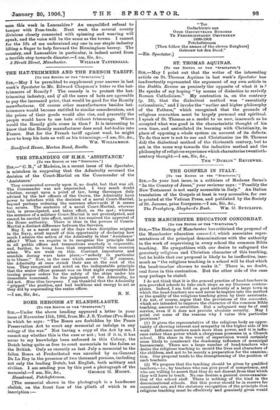THE STRANDING OF H.M.S. 'ASSISTANCE.'
[To THE EDITOR OF THE "SPECTATOR."] SIR,—" C. B.," of Madeira, in a recent issue of the Spectator, is mistaken in supposing that the Admiralty reversed the decision of the Court-Martial on the Commander of the
'Assistance.'
They commented severely upon it, no doubt, but that was all. The Commander was not superseded. I very much doubt whether, except upon a point of law, being thereupon duly advised by the law officers of the Crown, the Admiralty have power to interfere with the decision of a naval Court-Martial, beyond perhaps reducing the sentence afterwards if it seems too severe. The sentence of a naval Court-Martial, wherever held, is promulgated, and takes effect, on the spot ; whereas the sentence of a military Court-Martial is not promulgated, and cannot be carried into effect, until it has received the approval of the Home authority. There is thus in the powers of Courts- Martial a distinct difference betWeen the Services.
May I, as a naval man of the days when discipline reigned in the Navy, avail myself of this opportunity of declaring how much I admire the action of the Admiralty in that ' Assistance ' affair ? What we require is to recognise the principle that in all public offices and transactions somebody is responsible, and, further, to bring home that responsibility when occasion arises. We are weak on this. Contract impostures and scandals during wars take place,—" nobody in particular is to blame." Now, in the ease which causes "C. B." concern, the Admiralty at once struck their axe at. the root of the tree. They recognised and acted on the indisputable principle that the senior officer present was on that night responsible for issuing proper orders for the safety of the ships under his immediate command. In the judgment of the Admiralty, he did not. Hinz iliac lacrymae. I am thankful that the Admiralty "gripped" the position, and had backbone and energy to act as they did by superseding the senior officer.


































 Previous page
Previous page